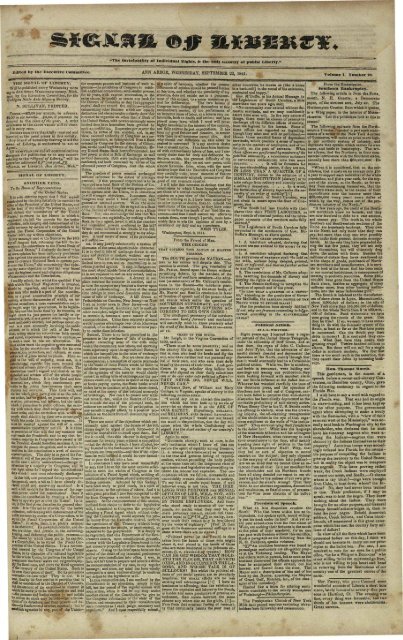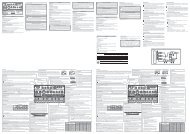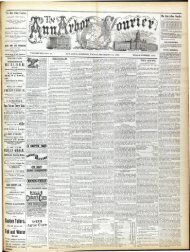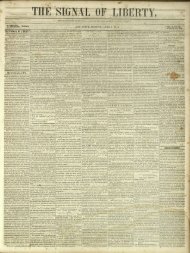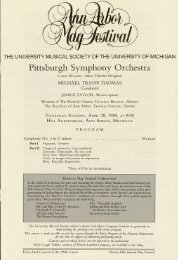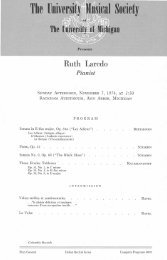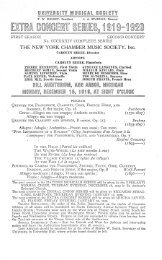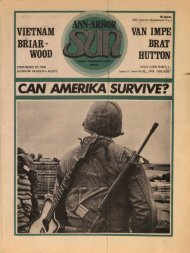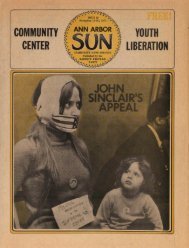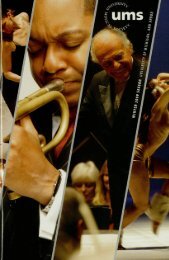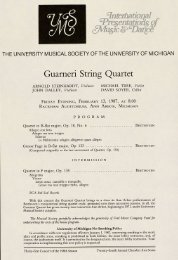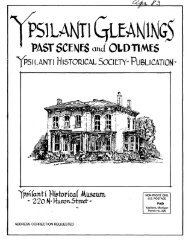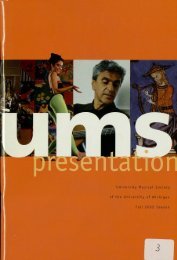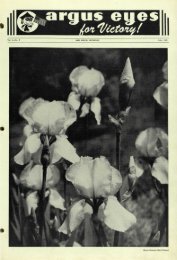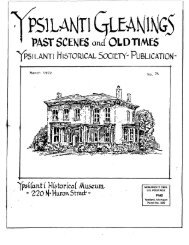Signal of Liberty. - Ann Arbor District Library
Signal of Liberty. - Ann Arbor District Library
Signal of Liberty. - Ann Arbor District Library
You also want an ePaper? Increase the reach of your titles
YUMPU automatically turns print PDFs into web optimized ePapers that Google loves.
w
parts <strong>of</strong> the Union. A Fortification bill has The reign <strong>of</strong> terror in Cinciuatati. tremble at such au atrocity; and if this |an abolitionist, he both diminishes the<br />
SIGNAL OF LIBERT*'. also been passed, providing- for the defence The last Philanthropist bring8 the partic- city docs not humble itself in dust and ;sirength <strong>of</strong> his former friends and adds to<br />
<strong>of</strong> the country, while provision has been made ulars <strong>of</strong> the late mob in that city which last-<br />
ashes, Heaven's curso will yet sink it low<br />
er than Sodom."'<br />
Wednesday, September 32, 1841. for the supply <strong>of</strong> the necessary expenses <strong>of</strong> ed several days. We have condensed the<br />
The Cincinnati Chronicle says:<br />
the nation. These great interests, then, following account from some ten columns <strong>of</strong><br />
LIBERTY TICKET.<br />
"In respect to the firing <strong>of</strong> the negroes,<br />
have received the attention which they ile- that paper.<br />
the right and wrong <strong>of</strong> such an attack de-<br />
For President,<br />
eerved, and have been finally disposed <strong>of</strong>. On the evening <strong>of</strong> Tuesday, Aug. 31, a pends upon the circumstances <strong>of</strong> the at-<br />
JAMES G. BIRNEY, <strong>of</strong> New Yorh. Now wo come to our Whig abolition<br />
quarrel took place between a party <strong>of</strong> netack. A man's house in his castle, by the<br />
For Vice President,<br />
friends once more, after the expiration <strong>of</strong> a<br />
groes and some Irishmen which was renew- common law. His right to use weapon?<br />
THOMAS MORRIS, <strong>of</strong> Ohio.<br />
year, and, ask them if they are prepared to<br />
ed on the night following, and several per- <strong>of</strong> defence is one <strong>of</strong> the last resorl, in self-<br />
For Governor,<br />
go with us in support <strong>of</strong> the principles <strong>of</strong><br />
sons were wounded on both sides. The mob defence, onlyjustified by necessity. The<br />
JABEZ S. FITCH, <strong>of</strong> Calhoun Co. liberty. Their great pecuniary interests<br />
attacked a negro boarding house where itwa3 (letter <strong>of</strong> the law will justify it in the defence<br />
<strong>of</strong> property; but we think in sel(-<br />
For Lieut. Governor, have been preserved and settled, and what<br />
NATHAN POWER, <strong>of</strong> Oakland Co.<br />
delence, that force should only be used in<br />
frow shall hinder them from attending to<br />
case <strong>of</strong> personal, or threatened personal,<br />
their own rights and those <strong>of</strong> the slave?—<br />
attack. This is a [matter <strong>of</strong> opinion.—<br />
"INESSENTIALS, U>UTY; IN NON-ESSENTIALS,<br />
LIBERTY; IN ALL THINGS, CHARITY." This same Whig Congress, which promised<br />
The restiit showed in what extremity they<br />
to defend the right <strong>of</strong> petition, has carried<br />
LECTURE ON SLAVERY. its outtages upon it farther than any preced-<br />
James G. Birney, <strong>of</strong> N. Y., will lee. ing one. From injuring a few it lias protnrc<br />
on Slavery at llic Court House, cee^^ to assault the the rights <strong>of</strong> all. Does<br />
in <strong>Ann</strong> <strong>Arbor</strong>, next Monday even-, this fact entllle lhe party t0 the confi_<br />
I dence and support <strong>of</strong> the friends <strong>of</strong> liberty?<br />
public generally are invited to at- i The threats <strong>of</strong> the slaveholders to persist to<br />
tend,<br />
the last extremity in resisting the right <strong>of</strong><br />
STATE CONVENTIONS.—It will be seen by<br />
petition, and all measures for the removal<br />
the notice in another column that the &tate<br />
<strong>of</strong> the abominations <strong>of</strong> the National Dis-<br />
Central Committee have appointed a series trict, and the stand recently taken by them<br />
<strong>of</strong> State <strong>Liberty</strong> Conventions in different in reference to the appointment <strong>of</strong> Northern<br />
counties. Now concerning these, we have men to <strong>of</strong>fice, call loudly upon all whig abo-<br />
a few suggestions to make, which may be litionists to determine whether they will lon-<br />
useful to some, and will injure nobody. ger continue to vote for a party which is<br />
1. The appointment <strong>of</strong> a Convention obliged to do ihe bidding <strong>of</strong> the slave power*<br />
amounts to nothing in itself. You all know in order to retain its ascendency. We ven-<br />
this, and yet it ought to be remembered. ture ths prophecy, that this call will be res-<br />
2. The number present at the Convenponded to at the present time. On account<br />
tionB will be determined by the readiness <strong>of</strong> <strong>of</strong> the settlement <strong>of</strong> those pecuniary inters<br />
every abolitionist to sttend them, and his ef- este which were formerly dear to them, and<br />
forts to induce other? to be present. They also because <strong>of</strong> the pro-slavery policy <strong>of</strong> the<br />
Will be large or small aezeal or indifference! dominant party, many who last year voted<br />
prevails. Letnonebe found who are lukewarm<br />
with the Whi 2 3 wi]1 now J oin the liberty<br />
* party with a hearty good will, and those<br />
3. The usefulness <strong>of</strong> these meetinga wiil who wil1 not do - do Bo > who Ilave formerly<br />
depend greatly upon the spirit manifested by- been reckoned among abolitionists, will bethose<br />
who attend. Every one who can com , e hardened in heart, and for the sake <strong>of</strong><br />
epeak to edification, (and who cannot speak' a mes3 <strong>of</strong> political pottage will sell their<br />
on this subject?) should prepare himself to ! consciences, and their reputation for love <strong>of</strong><br />
add something to the interest <strong>of</strong> the meet-, liberty, and identify themselves with those<br />
ing if it is but a mite. Think how highly aj who value human n £ ht3 far less than P art y<br />
certain person was spoken <strong>of</strong> by the Lord.— or pecuniary interests, and among whom<br />
"She has done what she could!" Could thev 0U S nt always to have remained.<br />
any thing have been said more highly to her To all Whig or Democratic abolitionists<br />
praise! If you will do as she did, you can who have hitherto acted with those parties,<br />
obtain the same commendaticn.<br />
we would propose this inquiry: Have you<br />
4. Foreign aid cannot be relied on. We, any reason to expect that the party with<br />
must abolitionize ourselves, and not wait to; which you act will be reformed and become<br />
be acted on in a state <strong>of</strong>passiveness. A dism<br />
any body.<br />
yourself.<br />
1 a <strong>Liberty</strong> parly, so that the rights <strong>of</strong> men<br />
position to do nothing till we are incited by. will receive that consideration and protection<br />
others, shows an inglorious, lazy disposition j from those parties which their importance.<br />
Remember that, and exert: demands'! If this cannot be expected it folj<br />
lows at once, that you support a pro-slavery<br />
5. In the absence <strong>of</strong> public lecturers, and party, and oppose an anti-slavery one: and<br />
pf funds to pay them, one <strong>of</strong> the greatest- |10W ]ong can you do this, and be an aboli-<br />
?neans <strong>of</strong> doing good, will be to obtain at the' tionist? Let it be distinctly remembered that<br />
Contentions, as many subscribers as possis' that he who now votes with either <strong>of</strong> the<br />
b!e for the <strong>Signal</strong>. No candid Whig or. grj-eat partjeSj votes against equal rights; —<br />
Democrat can pay for and read the <strong>Signal</strong> or' against a <strong>Liberty</strong> party, and against having<br />
any good abolition paper for a year without- eq,iaj anj exact justice rendered to all men.<br />
being fully convinced that our principles are t\ moment'? consideration will convince any<br />
right, and will succeed. j one that this declaration is neither harsh nor<br />
Tl»e Veto Message.<br />
We publish this document to-day on ac-' 1 ual J usllcG to al1 ll >e inhabitants <strong>of</strong> this<br />
count <strong>of</strong> the great importance <strong>of</strong> the subv State] Neiliier said a fugitive was secreted, and it was reported<br />
that guns or pistols were fired. The<br />
disturbance was quelled by the interference<br />
<strong>of</strong> some gcntlemen;<strong>of</strong> the neighborhood, and<br />
the police look no notice <strong>of</strong> the riot whatev- were. For we are told,on good authorier.<br />
On Thursday night, another rencontre ty, mi Saturday night, the persons <strong>of</strong> one<br />
took place in a different part <strong>of</strong> the city, or more negro women were violated under<br />
between some boys and youug men and a circumstances <strong>of</strong> inhuman barbarity 1<br />
party <strong>of</strong> negroes, in which two <strong>of</strong> the for- Now, we say that the man who won't demer<br />
were stabbed. They recovered, and affend<br />
his family from such desperadoes,<br />
has not human blood.<br />
terwards acknowledged they were the aggressors.<br />
Dr. Bailey avows his determination to con-<br />
There was much excitement during Fritinue<br />
the publication <strong>of</strong> the Philanthropist if<br />
day, and the negroes took the precaution to<br />
the abolitionists will only furnish the means,<br />
arm themselves. About 8 o'clock in the<br />
lie declares he will give place to the mob,<br />
evening, an immense mob assembled to at-<br />
no, not for an hour. The printer's loss<br />
tack the negro quarters. Many <strong>of</strong> the prom-<br />
amounts to about $800.<br />
inent leaders., were strangers, chiefly from<br />
We are well persuaded the abolitionists <strong>of</strong><br />
Kentucky, strongly backed up by boat hands<br />
- Which one dares to advoject,<br />
and the relation it bears to our national' cate a jury trial for all our colored citizens?<br />
affairs Tt will ho spen thnt tho P>pai<br />
we think is fully determined by bis decided ? b J ure lhc namc ' and take one morecongenopposition<br />
to their views as expressed in the j ial t0 hls P ractlce from the river. The Mayor addressed this<br />
assemblage, but they would not hear him, but<br />
cried out "down with /mn"—''fun him <strong>of</strong>f"—<br />
and commenced an attack on a n^gro house.<br />
The negroes fired upon the assailants and<br />
several were wounded, About one o'clock<br />
the mob procured an iron six pounder, and<br />
loaded it with boiler punchings, &c. and<br />
discharged it three times into the negro quarters.<br />
Many <strong>of</strong> the negroes fled, and a por»<br />
tion <strong>of</strong> the military having been called out,<br />
the mob was kept at bay.<br />
A meeting <strong>of</strong> the citizens was held at the<br />
Court House in the morning at svhich the<br />
Mayor presided. They resolved to observe<br />
the laws and discountenance mob's end that<br />
the Township Trustees enforce the law <strong>of</strong><br />
1007, requiring security <strong>of</strong> negroes pledging<br />
themselves to enforce it to the letter, until<br />
our city "is relieved <strong>of</strong> the effect <strong>of</strong> modern<br />
abolitionism," assuring "our Southern brethren,"<br />
to carry out that "act in faith"—and<br />
to deliver "up, under the law <strong>of</strong> Congress<br />
forthwith," every negro who escapes from<br />
his master and comes within our borders.—<br />
They requested the Mayor, Sheriff, and the<br />
civil authorities, to proceed at once to the<br />
dwellings <strong>of</strong> the blacks and disarm them<br />
<strong>of</strong> all <strong>of</strong>fensive weapons—and recommending<br />
search for <strong>of</strong>fenders against the Jaws, immediate<br />
legal proceedings against them, and an<br />
efficient patrol to protect the persons and<br />
property <strong>of</strong> the blacks, during the existence<br />
<strong>of</strong> the present excitement, and until they<br />
give the bonds required by the act <strong>of</strong> 1JJ07 or<br />
leave the city. They "Resolved, That we<br />
viuw with abhorrence the proceedings <strong>of</strong> the<br />
Abolitionists in our city, and that we repudiate<br />
their doctrines, and believe it be the<br />
duty <strong>of</strong> every good citizen by all lawful<br />
means to discountenance every man who<br />
lends them his assistance."<br />
During the day parlies <strong>of</strong> men and boys<br />
scoured the streets and dwellings, and secured<br />
all the negroes they could find, and<br />
brought them to one place, where they were<br />
kept surrounded by sentinels. The city au<br />
-<br />
two messages. Such being the case, al- In the remarks we havo made above, rethongh<br />
A Bank, or A Fiscal Agent may be speeting the Whig abolitionists, we shall not<br />
established at the next session <strong>of</strong> Congress, be understood as conceding the correctness<br />
v<br />
thorities disarmed the negroes and imarched<br />
250 <strong>of</strong> them to jail for safe keeping, accompanied<br />
by an immense mob, with deafening<br />
yells. In the evening, notwithstanding the<br />
presence <strong>of</strong> a large military force, which <strong>of</strong>fered<br />
little or no opposition, the mob broke<br />
into the Philanthropist <strong>of</strong>fice and broke two<br />
. . . „ , _ t> < . . . , ° presses into pieces with sledge hammers and<br />
it IB obvious that it will be far from meeting <strong>of</strong> their principle* or that any combination thrfiW ^ intft thp f%k£ • J^n; __ p_<br />
the views <strong>of</strong> those who have supported the <strong>of</strong> pecuniary distresses is a sufficient reason<br />
plans already rejected. The only way then, for doing wrong, or that they Acre not to<br />
in which such an institution as they wish blame for voting a proslavej^y ticket last fall,<br />
can succeed, is by putting it through both We have merely assumed the ground taken<br />
House« <strong>of</strong> Congress by a vote <strong>of</strong> two thirds, by themselves, and have demonstrated,from<br />
Such a vote cannot be hadduring'this presi- tll9ir OvVQ showing, that if they intend to uct<br />
idenlial term. We apprehend also that in for tlie caU6C <strong>of</strong> human rights, they have no<br />
New England and New York there is a grow- longer any excuse; the supposed efficacy <strong>of</strong><br />
iDg indifference to the existence <strong>of</strong> such au their former pleas having all passed away,<br />
institution among those who formerly advo- atl & that they must leave their imaginary<br />
cated its claims* We conceive, theo, that n^u'ral territory, and henceforth appear befor<br />
the present, if not far the future, the fore tue world, as voting abolitionists, or<br />
question <strong>of</strong> a great National Bank, <strong>of</strong> die-; voting pro-slavery partizans.<br />
count and exchange must belaid aside.<br />
With regard to the effect <strong>of</strong> this result<br />
OC/^The Michigan State Journal begins to<br />
upon the national politics we are not now' a " vocate the principles <strong>of</strong> the <strong>Liberty</strong> party.<br />
prepared to speculate. We wish rather to<br />
pall attention to the fact this "GREAT INTER- last P a P er<br />
Witness the following noble sentiment in the<br />
EST" is, for the present, disposed <strong>of</strong>. "We tell you, Jacobins, that the RIGHTS<br />
Many <strong>of</strong> our friends who had been <strong>of</strong>MENare not ««p# abstractions or idle<br />
| words for demagogues to win power with.<br />
known for years as decided a oii ms.s, jjut suhs(an(ja| and living realities,<br />
felt last year, that they must, , Jor this once,' .^- all legitimate means and si comsecurivote<br />
the whig nomination in order to secure: llC3 w|,jc|, enable people t improve lheir<br />
the safety <strong>of</strong> those other great interests condition in this world,and exemption from<br />
which that party advocated. They were, all unnecessary dangerous temptations<br />
successful, and the old administntion, which whir-h might peril their imortal well bethey<br />
conceived had been disastrous to the ' n threw them into the river, except some fragments<br />
which were carried to Kentucky as<br />
trophies <strong>of</strong> victory. The type had been removed.<br />
Several negro houses were broken<br />
open^ in' different, parts <strong>of</strong> the city and the<br />
doors, windows and furniture totally destroyed.<br />
The ne^ro church was destroyed,<br />
and several houseg adjoining it. They attacked<br />
the confectionary establishment <strong>of</strong><br />
Burnett (against whom a recent mob was<br />
directed) and thoroughly riddled that and<br />
the bouses <strong>of</strong> several abolitionists, and were<br />
proceeding to fire or otherwise destroy a<br />
book establishment, when some twenty or<br />
thirty <strong>of</strong> the leaders were arrested and pu^<br />
in jail, and the disturbance ended.<br />
It was the intention <strong>of</strong> the mob to attack<br />
the persons aa '*'el! as the property <strong>of</strong> abolitionists,<br />
but the timely arrival <strong>of</strong> Governor<br />
Corwin on Saturday, and his efficient exertions<br />
disconcerted their plans. Says the<br />
Philanthropist—<br />
"The slaveholder has triumphed. All<br />
he required, is granted. The evening <strong>of</strong><br />
that day consummates his triumph. The<br />
"move," sure enough, is no "id!e'<br />
g-"<br />
country, wag removed, and the other great We hope tje Editor, having discovered<br />
interests which they had in view, have re- that the rights <strong>of</strong> men are realities, will supceived<br />
the attention <strong>of</strong> a session <strong>of</strong> Congress port the "legitimate means and securities"<br />
called for that express purpose. The Sub- which will enable all the people to "improve<br />
•Treasury has been repealed. The distribu- their condition." Suppose the Journal<br />
tion <strong>of</strong> the proceeds <strong>of</strong> the public lands has should advocate "the legitimate security" <strong>of</strong><br />
been placed on a permanent footing, and a a trial by jury to ail the colored people <strong>of</strong><br />
General Bankrupt law has been passed, this State, and no longer treat the eubject as<br />
.vhese influence will extend to the remotest an "empty abstraction."<br />
r that <strong>of</strong> iheir opposers; and hence every<br />
<strong>Liberty</strong> vote may be truly said to count<br />
doubly for liberty, and against slavery.<br />
4. Every additional vote given for lib<br />
crty encourages its friends. It i3<br />
not<br />
thrown away on them.<br />
5. Every <strong>Liberty</strong> vote tends material.<br />
ly to purify the churches from slaveholding<br />
influences. This may be thought a singu,,<br />
lar proposition, and yet it will be found<br />
strictly true. Here is a church where all<br />
the voters arc so impressed with abhorrance<br />
<strong>of</strong> slavery, that they vote againsf<br />
all slaveholders who inay be nominated<br />
for <strong>of</strong>fice and against all parties which<br />
support the enormities <strong>of</strong> the system.—<br />
When the same men are assembled in the<br />
church meeting, do you think they w\\\<br />
vote for a slaveholder, or a proslavery<br />
man for minister, or deacon, or elder?—<br />
They certainly will not. And when they<br />
have excluded such men from political<br />
fellowship they will not long give them<br />
the privilege <strong>of</strong> communion in thechurch.<br />
The influence <strong>of</strong> the ballot box thus tell$<br />
effectually on the anti slavery progress,<br />
<strong>of</strong> ihe churches.<br />
only paper to be thus pot down by a mob.<br />
6. He who voles a liberty ticket, and by<br />
'(Ttuoiviug away Voles."<br />
the force <strong>of</strong> moral principle bids adieu to,<br />
A friend who was formerly a Whig,said<br />
his old party influence.", and in the face.<strong>of</strong><br />
tons the other day that he had determined<br />
opposition gives his suffrages for the cause,<br />
to vote the <strong>Liberty</strong> ticket this year, altho'<br />
<strong>of</strong> human rights, greatly benefits himself.<br />
he confessed it looked very much like<br />
He raises himself in the estimation <strong>of</strong> com><br />
throwing away his voie. lie could not<br />
mur.ity. He is regarded with respect and<br />
see distinctly what good it would do. This<br />
confidence. At the election in Oakland<br />
remark led us to reflect on the subject,<br />
county last fall, a gentleman whom we<br />
and we came to the following conclusions:<br />
could name if it was proper, was seen to,<br />
1. Every vote cast for sustaining the<br />
go up to tho polls with a long list <strong>of</strong> writ-<br />
principle that al! men ought to be free. i3<br />
ipot thrown away upon the slaveholders.—<br />
ten tickets. lie had been known as a<br />
Far from it. They have an absorbing in-<br />
whig, and as a man <strong>of</strong> remarkable candor<br />
terest in it. The very annunciation <strong>of</strong><br />
and firmness. .When questioned, he said<br />
ihc fact, that fur the first time since we<br />
that he intended to vote a <strong>Liberty</strong> Ticket<br />
became a people, votes for universal liber-<br />
throughout.<br />
ty, cast by an organized party, pledged to<br />
"But" said one, "why throw away your<br />
(hat object, were put into the ballot boxes vote? You know that Biniey will not bo<br />
iti thirteen states, in the same year, rilled elected."<br />
the hearts <strong>of</strong> many slaveholders with alarm "I know" said he, "ihat he will not be<br />
and anxiety. While we resulted only to elected this year: but my business is to<br />
petitions and moral suasion, they refused DO RIGHT. God requires me to use<br />
to recieve the one, and resisted the other. nil my political and moral influence in be-<br />
They were politically safe by securing half <strong>of</strong> human liberty; and that I am de-<br />
fhe aid <strong>of</strong> our obedient proslavcry memtermined to do, whether others will do so<br />
bers <strong>of</strong> Congress*. Hut when the princi- or not."<br />
ples <strong>of</strong> liberty should he revived in all "But what are these other written voles,<br />
you have here?"<br />
their purity and excellence, and the spirit<br />
'•They are the names <strong>of</strong> friends <strong>of</strong> Lib*<br />
which incited our fathers to suffering and erty in this County whom I intend to vote<br />
death should revisit their children, who for lo fill all the county <strong>of</strong>fices."<br />
could tell what the result might be? The "Will any body join you in voting for<br />
spirit <strong>of</strong> Adams and Hancock might spring<br />
these men?'<br />
"1 do not know. I have given myself<br />
forth from the dead in the persons <strong>of</strong> their no uneasiness about that. My business is<br />
descendants, and revivify the principles to vote for good men; and if no one will<br />
which once made the hiiis <strong>of</strong> New England join me, I shall do it alone."<br />
to ring with freedom. The very fact that The course <strong>of</strong> this man made a stron^<br />
impression on others, and it strengthened<br />
any number <strong>of</strong> men can be found who are<br />
his own moral feelings and his intellectual<br />
willing to lay aside party prejudices and energy. By following out his convictions,<br />
parly differences to resist their usurped he became a nobler and a better man than<br />
authority over the slave mid the free, is before: and his vote was not thrown away,<br />
ominous to them. It is a foreboding <strong>of</strong> c— but at the coining and each succeeding<br />
election it will increase and multiply ex-<br />
vil—it speaks toUcir intercpfs and their<br />
ceedingly.<br />
consciences, assuring them that their op- If, then, it be true that every vote given<br />
pression? will no • tvgftr be borne unresis- lor human rights must necessarily strength<br />
ted. Ls it nothing V6 ti.cin that the num- J en live friends <strong>of</strong> <strong>Liberty</strong> and dishoarlcn<br />
ber <strong>of</strong> those in Vormcirit alone v,ho have i's enemies—if it diminishes pro-slavery<br />
influences in the churches and benefits the<br />
sworn eternal hatred to slavery has in-<br />
slave and the free colored man—and if it<br />
creased in less than one year from 319 lo adds to all the nobler qualities <strong>of</strong> the mini<br />
more than 2000? Such intelligence wii in those cases where such a vote is given<br />
not be read by them with indifference.—• for the sake <strong>of</strong> moral principle, who would'<br />
And every vote thus given for liberty m'us count such a vole thrown away? Among<br />
the 7000 who voted for Birney, we have<br />
in the nature <strong>of</strong> the case, tell effectually or<br />
never yet heard <strong>of</strong> one person who regret-<br />
ihe slaveholders. On them it cannot be ted he had thrown away his vote uj»on<br />
thrown away.<br />
such a cause. On the contrary, they^remember<br />
the fact, with pleasure, and in the<br />
2. Ii is not thrown away on the inter- same circumstances they would do thoests<br />
<strong>of</strong> the oppressed free people <strong>of</strong> color same thing again.<br />
Every vote given for equal rights aids in On the other side, he who votes with a<br />
bringing their wrongs and disabilities dis-<br />
pro-slavery party, encourages the olaveholder,<br />
saddens tho slave, hinders the<br />
tinctly before the public view, in dislodg- cause <strong>of</strong> universal freedom, sanctions the<br />
ing prejudice and in swelling the- amount prejudices <strong>of</strong> community, oppresses the<br />
<strong>of</strong> those influences which will yet remove free colored man, strengthens pro-slavery<br />
the erroneous views <strong>of</strong> the white popula- influence in church and state, encouration,<br />
and put all the colored people upon<br />
ges mob and lynch law, helps to cheat the<br />
North <strong>of</strong> its money, and aids in destroying<br />
that footing to which their intellectual and its liberties. Who would not count a vote<br />
moral qualifications shall entitle them. given for such purposes, or one followed<br />
3. The liberty votes nre not thrown a- by such results,most emphatically Tintowrf<br />
AWAY ?<br />
way upon either the Whig or Democratic<br />
parties. If the}' were not <strong>of</strong> any conse- Important from Washington—reiquence,<br />
they would not be sought for by iguation <strong>of</strong> tlie Cabinet.<br />
those parlies. They are esteemed to be Messrs. Ewing, Bell, Badger, Crrttenden<br />
and Granger have resigned their respective-<br />
<strong>of</strong> very great momentjand strenuous exer<strong>of</strong>fices in the Cabinet. Mr. Websterr in a.<br />
tions are used by them to prevent their ad- published letter, has signified his intontion<br />
one, but herents from joining the <strong>Liberty</strong> party.—<br />
to remain at his post, at least for the present,<br />
and seems to regret that such an abrupt<br />
is "carried out in good faith" towards "our In most <strong>of</strong> the States, the parties are so proceeding should have been made.<br />
Southern brethren." Two presses are nearly balanced that a few votes turn the The now Cabinet, <strong>of</strong> President Tyler, is<br />
thrown into the river; property to the<br />
composed <strong>of</strong> the following persons:<br />
amount <strong>of</strong> thousands <strong>of</strong> dollars is destroyed;<br />
scale, and it becomes all important to se- Daniel Webster, Secretary <strong>of</strong> State.<br />
and, as if to make the infamy <strong>of</strong> ihc city cure those few. Gov. Morton was elected Walter Forwaid, <strong>of</strong> Penn., Secretary <strong>of</strong><br />
beyond all parallel, after having disarmed in Massachusetts by a majority <strong>of</strong> one vote he Treasury.<br />
the blacks, marched the men to jail, and in about one hundred thousand. Now what<br />
John McLean, <strong>of</strong> Ohio, Secretary <strong>of</strong> War,<br />
pledged the faith <strong>of</strong> the city t6 proteet<br />
A. P. Upshur, <strong>of</strong> Virginia, Secretary <strong>of</strong><br />
their wives and children and property, the<br />
signified all the efforts <strong>of</strong> the unsuccessful he Navy.<br />
mob is suffered to demolish their houses, party to sepure 50,000 votes while they C. A. WicklnTe, <strong>of</strong> Ky., Post Master<br />
Jeneral.<br />
break open their trunks and bureaus, and lacked that one? When a voter leaves<br />
Hugh. S. Legare, <strong>of</strong> S. C. Attorney Gen-<br />
violate their women! Hell itself must the Whig or Democraticparty,and becomes oral.
John Qukncy Adams.<br />
the time that Garrison first commenced<br />
This gentleman has been in public life, at his efforts till ihe presant time, and men-<br />
home and abroad more than fif:y years, and lioned many instances where the moral<br />
jias had perhaps greater advantages than any suasion efibrts <strong>of</strong> ubolitionists had been<br />
;nan living to observe and fully understand met and rebuked by ministers and church<br />
the practical working <strong>of</strong> the different polit- ? s with ,. the ex[l()|l!lti »n to carry the cause<br />
ical parties <strong>of</strong> the nation. The following<br />
into politics, where it properly belonged,<br />
and without the aid <strong>of</strong> which it could nev-<br />
testimony in reference to the existence and<br />
er succeed. In the propriety <strong>of</strong> this course<br />
potency <strong>of</strong> the slave power in the nation, as Mr. II. fully believed. Moral suasion and<br />
jexpreseed by him in a report, on manufac. political action must go hand in hand.—<br />
ture» in 1833, is certainly entitled to great Every individual was under solemn res-<br />
weight. It is not, in any technical sense <strong>of</strong> ponsibilities to do all in his power for the<br />
the word, an abolition testimony, inasmuch removal <strong>of</strong> every evil that afflicts humani-<br />
as it was the result <strong>of</strong> Mr. Adams' deliberate<br />
ty. He alluded with feeling and eloquence,<br />
to his own connection as a minister <strong>of</strong> the<br />
judgment| before abolition had become a sub-<br />
Presbyterian church, standing there and<br />
ject <strong>of</strong> universal investigation.<br />
taking an approving part in the proceed-<br />
The representatives <strong>of</strong> slave property ings <strong>of</strong> a political convention. He well<br />
in Congresss, constitute a combined and knew that such a course was contrary to<br />
.concentrated power, always operating to the feelings and views <strong>of</strong> nearly or quite<br />
the support and favor <strong>of</strong> dm slaveholding ill ihe ministerial brethren <strong>of</strong> his denom-<br />
interest, and against (he northern free inination in the State. Yet how could he<br />
terest. The history <strong>of</strong> the Union has af- do less? Ho felt obliged to pray for the<br />
forded a continued pro<strong>of</strong> that this repre- deliveranco ol'tho slave everysabUath day<br />
sentation <strong>of</strong> property has secured (o the as well as in thy prayer meeting and a-<br />
slaveholding States the entire control <strong>of</strong> roundthe family aitar.nnd he enj< ined the<br />
the national policy, and almost without ex- same duty upon his people. ISiow if an<br />
ception the possession <strong>of</strong> the highest Ex- opportunity <strong>of</strong>fered, whereby, in conjunceclive<br />
<strong>of</strong>fice in the Union. Always united tion with others, he could aci for the cause<br />
in the purpose <strong>of</strong> regulating the affairs <strong>of</strong> <strong>of</strong> the slave, and, as he believed, act effi-<br />
jhe whole Union by the standard <strong>of</strong>flavcciently and successfully, why should ho<br />
holding interest, their disproportionate notaci? fn such a case, how could he<br />
numbers in the electoral colleges, have consistently pray that the slave might be<br />
enabled them, in ten out <strong>of</strong> twelve elec- set \'roe, and yet refuse to use the very<br />
tions, to confer the Chief Magistracy up- means tlmt Gud had put into h s hands to<br />
on one <strong>of</strong> their citizens. Their suffrages procure thai freedom?<br />
at every election have been almost exclu- Mr. II. said he was not only a ministei<br />
sively confined to a candidate <strong>of</strong> their own but he was a m.in, a brother, a son, a fa-<br />
caste.<br />
ther arid a citizen endowed with politico<br />
mvileges, which he was bound to use for<br />
For the <strong>Signal</strong> <strong>of</strong> <strong>Liberty</strong>. the good <strong>of</strong> mankind. In becoming a min<br />
The <strong>Liberty</strong> Convention at Salem. ister, he had not become divested <strong>of</strong> ,ihe<br />
The Convention met Sept. 15 pursuant responsibilities or privileges which pertain<br />
to previous notice, and was opened by ed to him as a human being, and a citizei<br />
prayer by Rev. Mr. Hamilton. John Peeb- <strong>of</strong> the United Stales. In assuming the<br />
les was called to the chair, and T. Foster sacred pr<strong>of</strong>ession, he had only added one<br />
appointed Secretary. The meeting was more responsibility to those which previ-<br />
then addressed by Me?s. Chandler, Barns jusly pressed upon him; and in receiving<br />
and Gawles, on the inefficiency <strong>of</strong> moral his, he had lost none <strong>of</strong> the others. It de<br />
suasion in itself, to accomplish the aboli- volved on him still to use his voice, his in<br />
tion <strong>of</strong> slavery,—the absurdity and ineffi- fluence, hi3 example and his vote to secacy<br />
<strong>of</strong> the old questioning system,— cure to his relatives, his neighbors anc<br />
and the proslavery character <strong>of</strong> both the<br />
fellow countrymen, their rights, their lib-<br />
great political parties.<br />
erty, their safety and happiness. He in<br />
common whh his fellow citizens, had<br />
Dr, Barns compared the use <strong>of</strong> moral voice in selecting the Representatives anc<br />
suasion alone, to one <strong>of</strong> those sham fight?, rulers <strong>of</strong> the people, and when he believec<br />
which were formerly so common in Mass- that his vote and his example would add<br />
achusetts. The whole country would be one single item to that influence which<br />
preparing for battle for days previous to would do away any <strong>of</strong> the evils <strong>of</strong> human-<br />
the appointed time. Every old musket<br />
would be newly burished, every lock exity, how could he refuse to make nse ot<br />
amined, every flint tested, and every cart- his vote and influence for the benefit ol<br />
ridge box replenished with the best <strong>of</strong> am- men, and in a cause which, he was well<br />
munition. When the period <strong>of</strong> this awful assured, had received, and would contin<br />
contest arrived, the parties met face to ue to receive, the approving smiles ol<br />
face, with fixed bayonets and frowning Heaven? He could not refuse, when he<br />
looks, and with deadly aim and coura- believed [hat good might be done, he must<br />
geous hearts, they poured forth the con- act.<br />
tents <strong>of</strong> Ihe weapons <strong>of</strong> death. Officers He clcsed by showing from many con-<br />
were seen riding over the field ,wiih drawn siderations, that public sentiment may be<br />
swords and foaming chargers, shouting to corrected, and that political action, united<br />
the combatants, and urging on ihe tide <strong>of</strong> with moral suasion will be surely success-<br />
war. Artillery also was used as an auxiliful, and he avowed his determination fully<br />
ary in the work <strong>of</strong> carnage, and while the to sustain, in both these bearings, the an-<br />
brazen cannon vomited forth its trementislavery enterprise. The resolution was<br />
dous contents to the right and left upon the adopted.<br />
impetuous foe, the heavens became blacks A subscription was then circulated to<br />
ened, Ihe very earth trembled, and the raise funds to assist in sustaining the Sig-<br />
heart <strong>of</strong> the fearful quaked within him — nal <strong>of</strong> <strong>Liberty</strong>, and after uniting in prayer<br />
When the smoke had rolled away from the the Convention adjourned.<br />
field, and the results <strong>of</strong> the victory were<br />
T. FOSTER, Secretaryascertained,<br />
it was found that not a hair<br />
<strong>of</strong> any one's head had been injured, and For the <strong>Signal</strong> <strong>of</strong> <strong>Liberty</strong>.<br />
the only damage that could be discovered MESSRS EDITORS:—Being in company,<br />
was seen in the soiled apparel and smutty the other day, with some gentlemen to<br />
and blackened faces <strong>of</strong> the combatants.—• whom I presented the last number <strong>of</strong> your<br />
There was all the apparatus <strong>of</strong> war in paper, I was told by one <strong>of</strong> the party, on<br />
complete order and energetically applied; his returning it, that he was an abolition-<br />
and yet no execution was done, because ist, but not apolitical abolitionist: this led<br />
no bullets were used! The indispensable to some additional conversation, which<br />
article for the use <strong>of</strong> which all the other suggested to my mind the following obser<br />
preparations were made, was thrown en- vations; which, should you think worthy<br />
tirely aside.-<br />
a place in the "<strong>Signal</strong>,<br />
Dr. B. then showcJ that moral suasion<br />
without political action would never accomplish<br />
the object that we seek, the abolition<br />
<strong>of</strong> all proslavery laws; and that it<br />
was indispensably necessary in our enterprise<br />
that we come to the contest well pro<br />
vided with BULLETS! He demonstrated<br />
that what bullets were in the fight, votes<br />
were in the antislavery cause, and that if<br />
vewill only use it,<br />
"WE have a weapon, firmer eef,<br />
And better than the bayonet:<br />
A weapon that comes down as still<br />
As snowflakes fall upon the sod;<br />
Yet executes a freeman's will<br />
AB lightning does the will <strong>of</strong> God!"<br />
The afternoon session was opened by<br />
prayer by Elder Bebins. The house<br />
was well filled, and was addressed by Dr.<br />
€owles, who related many interesting<br />
•facts which had come to his knowledge<br />
daring his residence at the South. After<br />
a full discussion <strong>of</strong> the financial power<strong>of</strong><br />
slavery, as manifested especially in<br />
the distribution <strong>of</strong> tl>e Surplus Revenue,<br />
and<strong>of</strong> the proceeds <strong>of</strong> the public lands by<br />
which every freeman in a slave state receives<br />
more than each freeman in a free<br />
.state, (and in some cases more than twice<br />
as much,) the Rev. Mr. Hamilton moved<br />
the adoption <strong>of</strong> the following resolution,<br />
which he supported at considerable<br />
length.<br />
Resolved, That the history <strong>of</strong> our cause<br />
furnishes ample pro<strong>of</strong> that political action<br />
is both consistent and indispensable to success,<br />
our enemies themselves beingjudg-<br />
He said he had been an anti-slavery<br />
man for ten years, and had observed the<br />
progress <strong>of</strong> the cause with much attention.<br />
1 drag in as an additional argument, the<br />
following, viz: The Constitution guarantees<br />
to the South a claim, an interest, a<br />
property in human blood! and therefore<br />
we have no right to interfere. We know<br />
what the Constitution grants, and wish to<br />
respect and observe every existing law.—<br />
Why then have we not a right to discuss<br />
the subject scientifically, morally, theologically<br />
or politically ? In discussing it scientifically,<br />
we do not intend destroying the<br />
laws <strong>of</strong> science. In investigating it morally,<br />
wo have no intention <strong>of</strong> perverting<br />
the laws <strong>of</strong> ethics. In reviewing it theologically,<br />
we adopt the laws <strong>of</strong> God; and<br />
in political considerations we receive the<br />
Constitution <strong>of</strong> the country: and have we<br />
not a right therefore, to discuss thisorany<br />
other subject thus, or by any other established<br />
rules? If we be free, we have a<br />
right—and if we have not that privilege,<br />
then we are also slaves; worse slaves than<br />
those <strong>of</strong> the South; as (hey were made so,<br />
contra volens, whilst we arc slaves <strong>of</strong> our<br />
own willing; having stopped our own<br />
mouths and tied our own tongues bo that<br />
we cannot speak when we wish; and bound<br />
our own hands so that all the world may<br />
thrash us, and laugh at our insanity! Yet<br />
we think that we are free. Alas! for the<br />
freedom that dare not ask, ifive ie free!!<br />
' are at your service<br />
for that purpose.<br />
POLITICAL ABOLITION.<br />
I am an abolitionist, but not a political<br />
abolitionist, or in other words, I should like<br />
the slaves to be free, but dorrt want to do<br />
any thing to set them free; this is a doctrine<br />
which prevails to a considerable extent,<br />
and appears to be <strong>of</strong> that species <strong>of</strong><br />
philanthropy, <strong>of</strong> which, James' speak<br />
when he savs, "and one <strong>of</strong> you say unto<br />
them, depart in peace, be ye warmed and<br />
filled, notwithstanding ye give them not<br />
those things which are needful to the body,<br />
what doth it pr<strong>of</strong>it?" So the non political<br />
abolitionist says: "depart in peace, be ye<br />
free, notwithstanding ye do none <strong>of</strong> those<br />
things which are needful to gain their<br />
freedom, whitt doth it pr<strong>of</strong>it? Will your<br />
(pseudo) good wishes free them? The<br />
question implies a negative answer. But<br />
you reply, we are willing to discuss the<br />
question <strong>of</strong> slavery: nay, we are ready to<br />
admit that slavery is an evil, but we hare<br />
no right to bring it into politics, because<br />
by so doing, we infringe upon the rights<br />
<strong>of</strong> the South, and instead <strong>of</strong> benefiting the<br />
slave, are only drawing tighter his bonds.<br />
This is either really believed, or it is adopled<br />
as a ready excuse, for want <strong>of</strong> a<br />
better argument.There are some however,<br />
whom this sophistry blinds. We will separate<br />
this double position and examine<br />
each part singly.<br />
1. We have no right to introduce abolition<br />
into politics, because by so doing, we<br />
are infringing upon the rights <strong>of</strong> the South.<br />
Then by the same rule, we have no business<br />
to agitate the Tariff question, for that<br />
also interferes with the interests <strong>of</strong> the<br />
South. But will the non-political abolitionists<br />
<strong>of</strong> the North, the East or the West<br />
admit the truth <strong>of</strong> thi9 assertion? I shall<br />
assume that they will not; then they will<br />
to frent into a history qf the cause from<br />
migl ' t 1 be S0 ' lf , the fl^*The following is an extract from<br />
very encouraging letter from one <strong>of</strong> our devoted<br />
friends in Kalamazoo County:<br />
MESSRS EDITORS :—I have obtained fou<br />
subscribers to the "<strong>Signal</strong> <strong>of</strong> <strong>Liberty</strong>;"<br />
would gladly furnish a list as long as a<br />
Anaconda, were it in my power. I
POETRY.<br />
their eyes. They do not think <strong>of</strong> being<br />
governed by moral principles in politics.<br />
A Call to the Ballot Box. They vote for drunkards and rumscllers,<br />
Come roiife ye, abolitionists,<br />
and adulterers, and pr<strong>of</strong>ane swearers, and<br />
slaveholders, as readily as they would for<br />
There ia no time to lose,<br />
Paul or Barnabas, and then sleep sweetly<br />
In gazing on the rainbow<br />
over their deed <strong>of</strong> darkness; as though<br />
Of "ScatterationV hues,<br />
they had done God service. When the<br />
For though the tints aro beautiful, torch ©f revolution blazes through our land<br />
They are refracted ligbt,<br />
—when the ashes <strong>of</strong> our towns are tram-<br />
And the pure diamonds <strong>of</strong> your rotes pled by the infuriate mob, and the cry <strong>of</strong><br />
Shine best in sunlight bright.<br />
rapine and blood goes up to heaven from<br />
amidst the devastation, let these men know<br />
And when these brilliant diamonds that they have done it. The men who in<br />
In Union's gold are set,<br />
Congress, or the executive department,<br />
Conflicting politicians<br />
now disgrace the nation, are not so- much<br />
Will strive your votes to get;<br />
to blame as those who voted to put them<br />
Which were they scattered in the rocks, in that conspicuous position. Oh ye chris<br />
Each in a teparate vein,<br />
tians! who thus enthrone the Prince <strong>of</strong><br />
They'd think not worth the trouble<br />
Darkness, and shout in triumph over his<br />
successes* was it to fit ye for such recrean-<br />
Of striving to obtain.<br />
cy that yc were sealed and babiized, with<br />
Then rouse yc! abolitionists,<br />
the blood <strong>of</strong> the Redeemer! Did ye take<br />
There is no time to lose,<br />
the vows <strong>of</strong> God upon you to become the<br />
In gazing on the rainbow<br />
obsequious supporters <strong>of</strong> such tramplers <strong>of</strong><br />
Of "Scatteration's" hues.<br />
His law as Atherton and Tyler?<br />
Emancipator. There must be reform—not the substitution<br />
<strong>of</strong> one evil for another—not a "Ty-<br />
From Hildreth's Despotism in America. ler too" reform, that proves its wickedness<br />
General idea<strong>of</strong> a Slstveholdinjf com by bringing its curse close on the heels <strong>of</strong><br />
jnuiilty.<br />
its triumph—but a reform that will exalt<br />
Slavery is a continuation <strong>of</strong> the state <strong>of</strong><br />
moral principle and the fear <strong>of</strong> God above<br />
war. It ia true that one <strong>of</strong> the Combatants<br />
"availability" and "regular nominations."<br />
is subdued and bound; but the war is not<br />
That reform must be achieved, not by<br />
terminated. If I do not put the captive to<br />
those who can look no higher than an <strong>of</strong>fice<br />
death, this apparent clemency does not<br />
and no further than a majority in a con-<br />
arise from any good will towards him, or<br />
tested election; but by men who feel their<br />
any extinction on my part <strong>of</strong> hostile feel- relation to eternal things, and who would<br />
ings and intentions. I spare his life mere- ^ nserve the moral interests <strong>of</strong> the country<br />
ly because I expect to be able to put him for years to come. It must be wrought<br />
to a use more advantageous to myself.— out by those who deem it their highest<br />
And if tho captive, on the othor hand, honor to abide by principle, leaving the<br />
feigns submission, still he is only watch- consequences to him who fixed the princiing<br />
for an opportunity to escape my grasp ple—in a word by Abolitionists.<br />
and, if possible, to inflict upon me evils as This is their day. The lime has come<br />
great as those to which I have subjected for them to strike for <strong>Liberty</strong>. There has<br />
or inem w f ir ' Ke ??. r ^oeriy. i nere nas<br />
um<br />
been enough <strong>of</strong>'policy' and'availability; 1<br />
War is justly regarded, and with the pro enough <strong>of</strong> choosing 'the least <strong>of</strong> two evils,<br />
grees <strong>of</strong> civilization it comes every day<br />
more and more to be regarded, as the very<br />
greatest <strong>of</strong> social calamities. The introduction<br />
<strong>of</strong> slavery into a community amounts<br />
to an eternal protraction <strong>of</strong> that<br />
calamity, and a universal diffusion <strong>of</strong> it<br />
through the whole mass <strong>of</strong> society and that<br />
too, in its most ferocious form.<br />
When a country is invaded with a hostile<br />
army, within the immediate neighborhood<br />
<strong>of</strong> the camp, it becomes imppossible<br />
to make any effectual resistance. Howover<br />
fierce may be the hate with which<br />
they look upon the invaders, the inhabitants<br />
within the range <strong>of</strong> their scouting<br />
parties are obliged to submit. They are<br />
made to furnish wood, forage and provisions;<br />
they are forced to toil in the entrenchment<br />
<strong>of</strong> the camp; their houses are<br />
liable to be ransacked and plundered, and<br />
their women to be subjected to the lusts <strong>of</strong><br />
the soldiers. Upon certain emergencies,<br />
the ablest bodied among them will be arm -<br />
ed, surrounded by foreign squadrons, and<br />
obliged to fight against their own countrymen.<br />
Cut,though plundered without mercy,<br />
and liable to the most frightful injuries<br />
yet,as their services are valuable, and even<br />
necessary to the invaders, they must be<br />
allowed to retain the means <strong>of</strong> sustaining<br />
existence; and if,under all the discouragements<br />
to which they are subjected, they<br />
neglect or refuse to cultivate their fields,<br />
they must be driven to work at the point<br />
<strong>of</strong> the bayonet, lest the invaders might suffer<br />
from their negligence, and fall short <strong>of</strong><br />
forage and provisions.<br />
Now, every plantation in the slave<br />
States is to be looked upon as the seat <strong>of</strong><br />
a little camp, which overawes and keeps<br />
in subjection the surrounding peasantry.<br />
The master claims and exercises over<br />
his slaves all the rights <strong>of</strong> war above described,<br />
and others yet more terrible. Consider,<br />
too. that this infliction is not limited<br />
to a single neighborhood, as in the case<br />
<strong>of</strong> an invading army, but is scattered and<br />
diffused over the whole extent <strong>of</strong> the country;<br />
nor is it temporary, as in the other<br />
case, but constant and perpetual. It ia by<br />
taking a view like this, that we are enabled<br />
to form a primary, general outline<br />
idea <strong>of</strong> the social condition <strong>of</strong> a slaveholding<br />
community.<br />
RESPOMSIBILITT OF voxBRs.-The People's<br />
Advocate gives a synopsis <strong>of</strong> the debate in<br />
Congresq, in which members denounced<br />
President Tyler as " a miserable wretch,"<br />
Francis Granger as "a black hearted abolitionist,"<br />
and all abolitioniats as worthy ol<br />
having "the mark <strong>of</strong> Hell set upon them,"<br />
and adds the following spirited remarks upon<br />
the source <strong>of</strong> such disgraceful scenes.<br />
Such are the doings <strong>of</strong> the Legislature o;<br />
a civilized—an enlightend nation,—a nation<br />
boasting <strong>of</strong> iia liberty and republicanism!<br />
We are Bick at heart as we reac<br />
such things. Why the heathen Senators <strong>of</strong><br />
Rome, or the Democratic multitude oCsemi<br />
barbarous Greece, never stooped to sucl<br />
base and abandoned blackguardism as this<br />
It is unparalleled in the history <strong>of</strong> legislation,<br />
and it assures us that revolution is<br />
at hand, unless a timely reform shall avert<br />
the danger. Good men, if God's mercy<br />
has left any good men among us, will ask<br />
by what means such a state <strong>of</strong> things exists;<br />
yet few we fear will be ready to apply<br />
the remedy.<br />
We can easily fiud the source <strong>of</strong> the evil<br />
if we will. It lies just here, that men who<br />
pr<strong>of</strong>ess to fear God are the slaves <strong>of</strong> party<br />
and vote for tne mo3t unprincipled, and<br />
God abandoned <strong>of</strong> their race, because they<br />
are "regularly nominated" by the party.<br />
The great mass <strong>of</strong> Christians, when they go<br />
to the polls have no fear <strong>of</strong> God before<br />
1<br />
Coiigre!*s--Whi{j{fe»<br />
and <strong>of</strong> all sorts <strong>of</strong> political compromising.<br />
Henceforth let us be Independent] neither<br />
Whigs, nor Van Buren men, but Abolition<br />
ists; glorying that we are permitted to labor<br />
and suffer in so good a cauac as that<br />
<strong>of</strong> the redemption <strong>of</strong> our country.<br />
From the Maine Address.<br />
The INortli and the South.<br />
The people can surely be brought to<br />
soe that men reared upon the bosom <strong>of</strong><br />
slavery, accustomed from infancy to the<br />
xercise <strong>of</strong> despotic power, and are disqualified<br />
lo rule a nation <strong>of</strong> freemen.—<br />
That men accustomed only to a system <strong>of</strong><br />
coerced labor, and themselves living in<br />
splendor on the unrequited toil <strong>of</strong> others,<br />
are altogether incompetent to legislate for|<br />
he industrious and laboring population <strong>of</strong><br />
the free States. That free and slave<br />
abor cannot, in fact, be made to prosper<br />
under the same system <strong>of</strong> legislation; and<br />
that in the preponderating influence <strong>of</strong> the<br />
South in our national councils, the interists<br />
<strong>of</strong> the former will ever be sacrificed<br />
o those <strong>of</strong> the latter. The people surely<br />
can be made to understand, and that speedily,<br />
that the fluctuating policy <strong>of</strong> our na<br />
ional government, by which, for the last<br />
hirty years the business <strong>of</strong> the North has<br />
>een vexed and destroyed, is all occaioned<br />
by the ever-changing views <strong>of</strong> the<br />
South, growing out <strong>of</strong> their fixed determination<br />
to maintain her system <strong>of</strong> forced<br />
and extravagant expenditure upon an equality<br />
with the paid labor and frugal<br />
habits <strong>of</strong> the North, ft will not require<br />
any very protracted effort to make the<br />
>eople understand, that while at the North<br />
where one-haif the population do work <strong>of</strong><br />
able-bodied laborers, capital can be increased<br />
only at the rate <strong>of</strong> from five to six<br />
>er cent—at the South, where less than<br />
one third do the work and sustain the other<br />
two-thirds in idleness, capital, instead<br />
<strong>of</strong> being increased, must be continually<br />
diminished, unless it receive constant supplies<br />
from abroad. And thus they may<br />
see how it is, that, in the shape <strong>of</strong> bad<br />
dubts, millions upon millions <strong>of</strong> the hard<br />
earnings <strong>of</strong> the North, are annually lust at<br />
the South—swollowed up in the great<br />
southern vortex occasioned by the waste<br />
and extravagances and riotous living <strong>of</strong><br />
southern taskmasters. The history <strong>of</strong> the<br />
suspended paper and almost universal<br />
bankruptcy <strong>of</strong> the South may be speedily<br />
written out, and a copy put in the hands<br />
% y..Abolilioii'.!<br />
Views ot tU« South.<br />
Mr. Dawsou and others succeeded in "We are assured in almost every num-<br />
restoring a temporary calm, which was ber, that public opinion at the North is<br />
soon broken up bya speech <strong>of</strong> Mr. Payne, sound, and that only a few obscure pow-<br />
democrat and slaveholder, <strong>of</strong> Alabama, erless individuals are moving in this mat-<br />
who charged that Mr. Granger was markter. It does not enter into my present<br />
ed with the black and hateful stain <strong>of</strong> ab


